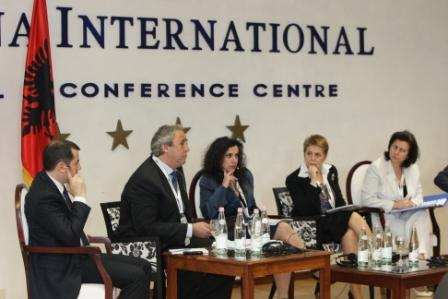
Swiss Cooperation supported the IFC initiative to organise a waste management roundtable showcasing examples of public-private partnerships. Over 70 participants gathered to discuss issues and create networks in a dynamic setting.
Tuesday, March 13th, 2012, Tirana – The Swiss Cooperation Office in Albania supported the IFC in organising for the first time in Albania a roundtable on integrated solid waste management. The event brought together all relevant actors and institutions that presented findings in waste management studies and discussed innovative solutions such as public-private partnerships.
“Today’s roundtable is not an end in itself, but only a means to raise awareness and prompt action for improving the way solid waste is treated in Albania”, said the Swiss Cooperation’s Country Director, Ms. Isabel Perich. “We are here to suggest and discuss ways of improving the country’s management of solid waste – a serious concern that has health, economic, and social consequences”, said Ms. Perich while emphasizing the need to focus on concrete solutions and come up with practical steps to be taken.
During his speech, Deputy Minister of Environment, Mr. Taulant Bino said: “The new legislation framework on Public Private Partnerships and the one on concessions create new opportunities for Public Private Partnerships in the sector of solid waste management”. He also added that “local government authorities supported by central government must engage with these new opportunities in order to fulfill European standards in waste management and to improve the quality of life for our citizens”.
After that the Deputy Minister of Public Works, Mr. Ylli Manjani urged local authorities to own up to their duty of dealing with waste management issues. The event proceeded with a presentation of findings from an IFC study that indicates the situation with waste issues in key cities of Albania. A dynamic and participatory approach was used throughout the event and the participants were encouraged to share ideas and discuss.
Interesting examples from Swiss-supported initiatives from Shkodër and Lezhë areas were presented that contained real cases of public-private partnerships already established in these two cities. Two Swiss experts also presented successful public-private partnerships from other countries.
Overall, the roundtable provided an innovative setting for representatives of the local and central government, parliamentarians, private sector, NGOs, IFC and Swiss experts in relevant areas, international financing institutions and donor organizations to discuss issues regarding private sector participation in sustainable and integrated solid waste management projects in Albania’s municipalities, as well as international best practice in this field.
Sustainable and integrated solid waste management refers to the economically profitable, environmentally and socially responsible solid waste management, which includes recycling, reusing, co-processing, incineration, pre-treatment and landfilling of solid waste. Sustainable and integrated solid waste management eliminates uncontrolled burning or dumping of waste.
The Swiss Cooperation Office in Albania supports local and central government in their efforts to improve public services, decentralisation and regional development.
Roundtable on Waste Management Solutions and Public-Private Partnerships Brings Actors Together
Swiss Cooperation supported the IFC initiative to organise a waste management roundtable showcasing examples of public-private partnerships. Over 70 participants gathered to discuss issues and create networks in a dynamic setting.
Tuesday, March 13th, 2012, Tirana – The Swiss Cooperation Office in Albania supported the IFC in organising for the first time in Albania a roundtable on integrated solid waste management. The event brought together all relevant actors and institutions that presented findings in waste management studies and discussed innovative solutions such as public-private partnerships.
“Today’s roundtable is not an end in itself, but only a means to raise awareness and prompt action for improving the way solid waste is treated in Albania”, said the Swiss Cooperation’s Country Director, Ms. Isabel Perich. “We are here to suggest and discuss ways of improving the country’s management of solid waste – a serious concern that has health, economic, and social consequences”, said Ms. Perich while emphasizing the need to focus on concrete solutions and come up with practical steps to be taken.
During his speech, Deputy Minister of Environment, Mr. Taulant Bino said: “The new legislation framework on Public Private Partnerships and the one on concessions create new opportunities for Public Private Partnerships in the sector of solid waste management”. He also added that “local government authorities supported by central government must engage with these new opportunities in order to fulfill European standards in waste management and to improve the quality of life for our citizens”.
After that the Deputy Minister of Public Works, Mr. Ylli Manjani urged local authorities to own up to their duty of dealing with waste management issues. The event proceeded with a presentation of findings from an IFC study that indicates the situation with waste issues in key cities of Albania. A dynamic and participatory approach was used throughout the event and the participants were encouraged to share ideas and discuss.
Interesting examples from Swiss-supported initiatives from Shkodër and Lezhë areas were presented that contained real cases of public-private partnerships already established in these two cities. Two Swiss experts also presented successful public-private partnerships from other countries.
Overall, the roundtable provided an innovative setting for representatives of the local and central government, parliamentarians, private sector, NGOs, IFC and Swiss experts in relevant areas, international financing institutions and donor organizations to discuss issues regarding private sector participation in sustainable and integrated solid waste management projects in Albania’s municipalities, as well as international best practice in this field.
Sustainable and integrated solid waste management refers to the economically profitable, environmentally and socially responsible solid waste management, which includes recycling, reusing, co-processing, incineration, pre-treatment and landfilling of solid waste. Sustainable and integrated solid waste management eliminates uncontrolled burning or dumping of waste.
The Swiss Cooperation Office in Albania supports local and central government in their efforts to improve public services, decentralisation and regional development.
Related posts
New functions and monitoring of performance indicators for LGUs
Read more
Funksionet e reja dhe monitorimi i treguesve të performancës tek NJQV
Read more
National Competition of Best Local Practices 2016
Read more